
The dos and don’ts of bar etiquette
Bartending in movies tends to alternate between skimpily clad bartenders dancing on a bar to the one guy in the background polishing a solitary glass while listening to everyone’s problems. The truth, though, is that most bartenders are highly trained and efficient professionals who are there to provide a service—and neither of those things is in the job description. Hopefully you know that … but do you know the etiquette rules of being a truly polite patron?
Even if you’re steering clear of the obvious faux pas, giving good tips and avoiding the things most people dislike, there are some specific “polite habits” in bars that aren’t quite as polite as you might think. And while bartenders might grin and bear it when you make these etiquette mistakes, just like restaurant staffers do, it doesn’t mean they like it! Plus, these missteps can really get in the way of them doing their jobs. So, whether you’re at your favorite dive bar, a trendy hotel bar or a cruise ship bar, here’s what you should avoid—and what you should do instead.
Get Reader’s Digest’s Read Up newsletter for more etiquette tips, humor, cleaning, travel, tech and fun facts all week long.

Asking them to do a shot with you
This was the No. 1 “polite” habit every single one of the bartenders we spoke with mentioned they wish people would stop doing. “I get that you’re offering because you want to be nice and have me join in the party, but you’re on your own time and I’m working,” says Lea Miner, a bartender at a restaurant in Colorado. “If I did a shot with every customer who asked, I’d be drunk in the first hour [of my shift].” She adds that most bars have a rule about bartenders not drinking on the job, but in her experience, “it’s 50/50 whether or not it actually gets enforced.”
Do this instead: Use the money you would have spent on the shot and add it to their tip. Or, says Miner, if you want to buy them a drink, tell them to add one to your tab and then the bartender can choose to drink it after their shift is over. Being pressured to drink with every guest is also one of the polite habits party hosts dislike.

Picking up your drink before they give it to you
A beer on tap doesn’t require any effort beyond filling the glass, but creating a cocktail is a work of art—and that includes any final touches like a garnish. “I take a lot of pride in creating custom cocktails that don’t just taste great but also look beautiful,” says Miner, “and I want the guest to have the full experience.” However, many customers think the cocktail is finished after the liquid has been added, and while you may think you’re being helpful by taking it at that point, especially if the bar is busy, it takes away from that experience. It’s also rude, since you’re literally grabbing something that’s still in the bartender’s possession.
Do this instead: Wait for the bartender to slide the drink to you, and let them present it in an attractive way, complete with napkin and garnishes. Make a mistake? No biggie—here’s how to apologize.
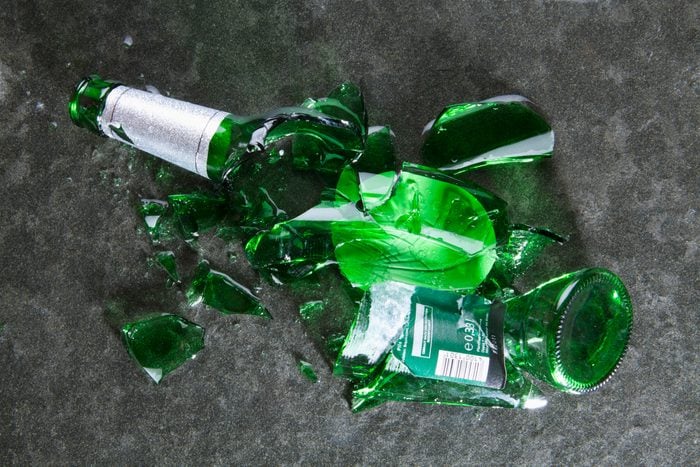
Cleaning up broken glass
Drop your drink? It’s OK—accidents happen. But think twice before getting down on the floor to clean it up. “Drunk people should never be in charge of picking up broken glass,” says Antonio Hernandez, a bartender at a speakeasy in Manhattan. You could cut yourself or injure someone else, and not only is that painful—it’s also a liability for the club.
Do this instead: “Just alert us to the problem, and let the staff clean it up,” Hernandez says. “We’re equipped to do it properly, and we can do it quickly and efficiently.” This is also one of the polite habits restaurant servers dislike.
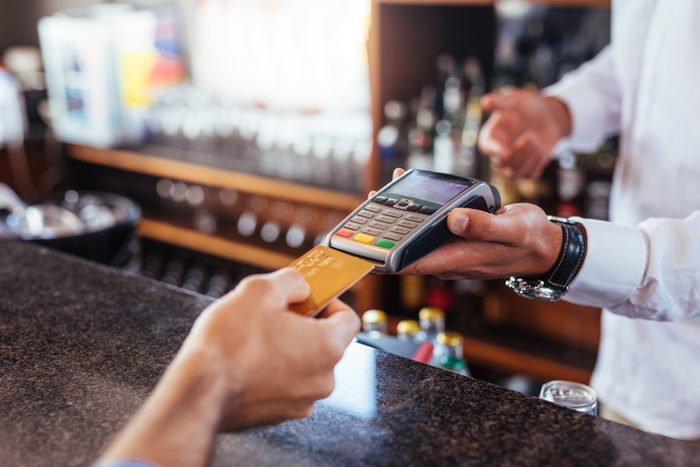
Itemizing and splitting a tab
It’s not uncommon for one person to start a tab for a whole group, and it’s a polite way to keep things simple for the bartender. But when you go to pay, things can get tricky. While it’s perfectly polite to ask them to split the tab equally between two or three credit cards, don’t ask your bartender to itemize the check by drink. (For instance, asking them to charge Bob’s credit card for three beers, Jill’s card for two mojitos, Jane’s card for a glass of wine and a margarita, and so on.) “This is too complicated for us to sort out, especially during a rush,” says Mary Joe, a bartender at a sports bar in Minneapolis, who notes that this is also bad restaurant etiquette.
Do this instead: Ideally, have one person close out the tab, and then the other people can Venmo that person. Or, if you know you are going to need the tab split individually, have each person start their own tab, Joe suggests.
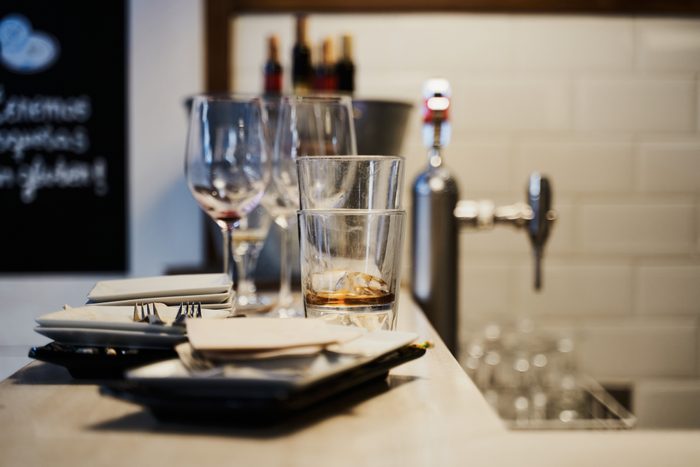
Stuffing napkins, straw wrappers or other trash into your cup
Cleaning up the mess in front of you is a kind gesture, and one that the bussers and bartenders definitely appreciate. But while stuffing all the trash into a glass may look contained and tidy, it actually creates more work. “Now I have to stick my fingers inside the used glasses and fish out soggy napkins,” Joe says.
Do this instead: If you see a trash can, put your trash directly in it. Otherwise, gather the trash in a pile on the table instead of stuffing it in your used glasses. This is also good etiquette at Italian restaurants and pretty much all others.
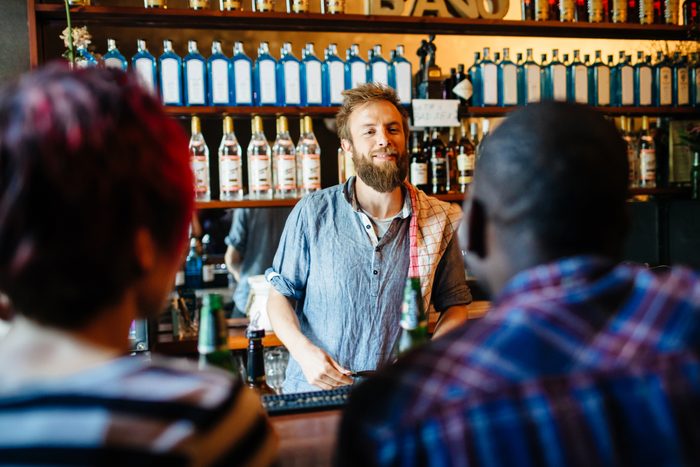
Telling them your life story
Bartenders are often seen as kind and sympathetic, and you may feel like it’s an honor to trust them with your problems. Plus, they could use the company, so it’s a win-win, isn’t it? Not exactly. For starters, they’re not therapists. And second, they’re working! “Sometimes customers will sit and chat with me for my whole shift, insisting on keeping me company, telling me they don’t want me to get bored or even saying they’re protecting me from other people who might have bad intentions,” say Miner. “But while I appreciate the thought, they’re rarely helpful, and they can make me miss out on tips.”
Do this instead: “When it’s slow, I don’t mind listening, but the truth is that we’re there to do our job, and we usually have lots of people to serve,” says Joe. “So be friendly and smile, but don’t keep chatting if we’re busy.” If you need some company, there are always the other patrons. Check out these conversation starters to help with small talk.
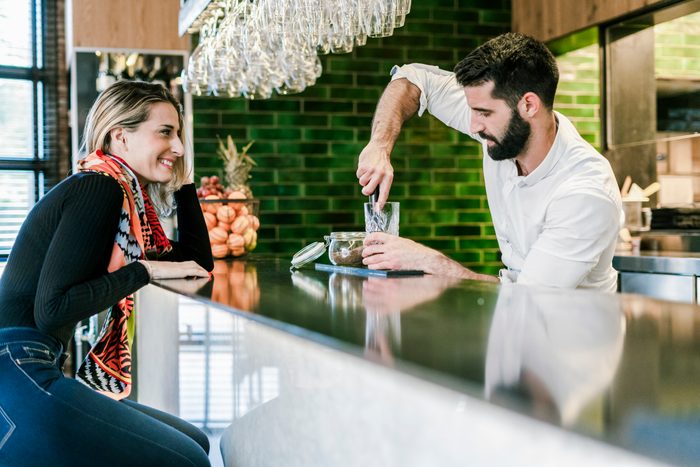
Asking them out
Did that cute bartender give you a special smile or touch your hand when giving your card back? Does that mean he or she likes you? Probably not. “We’re not into you, we’re not flirting with you and we do not want to go home with you,” says Miner. “Being kind and nice is part of our job. That’s it.”
Also, don’t ask what time they get off or where they live. That can come across as creepy and even threatening. Flight attendants also wish you would avoid this type of behavior.
Do this instead: Never assume your bartender is flirting with you. However, if you want to roll the dice on your own meet-cute story, it’s OK to give them your number on a napkin and leave the ball in their court, Miner says.
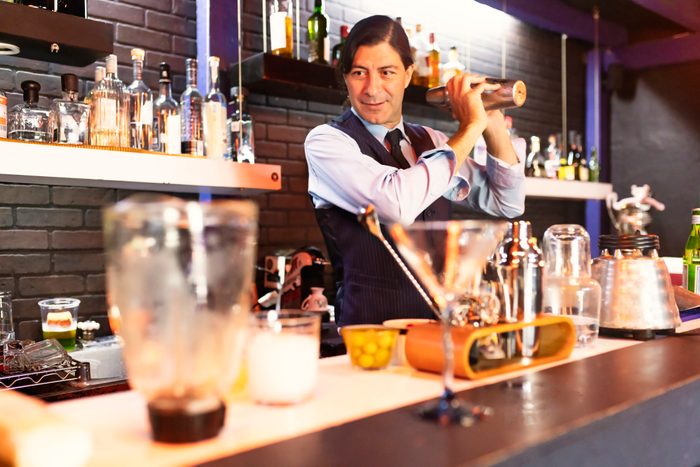
Reaching over or behind the bar to grab something quickly
Your empty glasses are piling up, and you can see the bussing station right behind the bar. Or perhaps you just need to grab an extra straw, and you know where they’re kept behind the counter. Maybe you’d just like an extra lemon, and it’s right there. Instead of wasting the busy bartender’s time, it’s fine to just quickly dart or reach behind the bar and grab what you need, right? “Wrong. Always wrong,” says Hernandez. “It’s already crowded back here, and we have things organized just so. Plus, if you put your dirty fingers into my fruit bin, I have to throw the whole thing out!”
Do this instead: If you need your table cleared, signal a waiter or busser to help. If you need something from the bar, wait your turn and ask for it.

Buying a round of drinks
A round of drinks for your friends! Cheers! Buying drinks for others is kind and fun, and the bartender will be more than happy to make it happen—as long as you know what everyone wants. “I love when someone volunteers, ‘I’m buying a round!'” says Joe. “But I cringe when they then turn around and say, ‘So, uh, what do you guys want?’ and I’m waiting 20 minutes for everyone to figure it out.”
Do this instead: Talk to your group and figure out everyone’s orders before approaching the bar. At the bar, be prepared to order everyone’s drinks at once. Then you can relax and think of the perfect toast to celebrate your buds.
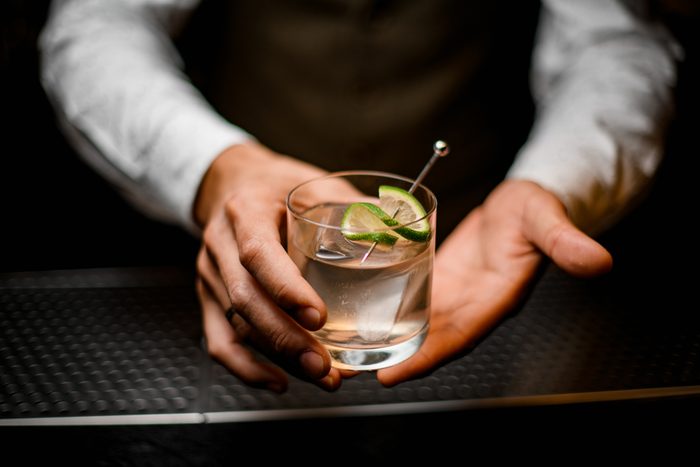
Asking them to “surprise you” with a drink
Asking the bartender, “What’s good here?” or saying, “Just surprise me with something good!” may be well intended—you’re trusting their educated opinion, after all. But alcohol preferences are so individual that all these statements really do is make the bartender play an uncomfortable guessing game trying to figure out what you like. “When I first started, I used to ask a lot of questions, trying to help them narrow it down,” says Hernandez. “But now, I just joke, ‘Don’t worry, we took all the bad drinks off the menu already—you’re safe,’ and hopefully they’ll get the hint to just order something off our well-curated menu.” He adds that it’s incredibly frustrating to spend a lot of time explaining different cocktails, only to have the person just order a beer.
Do this instead: If you need a suggestion, make it specific by telling them what kind of liquor or flavors you like. Or, if you truly want the bartender to surprise you, say that … but then be prepared to drink whatever it is without complaint, says Miner.
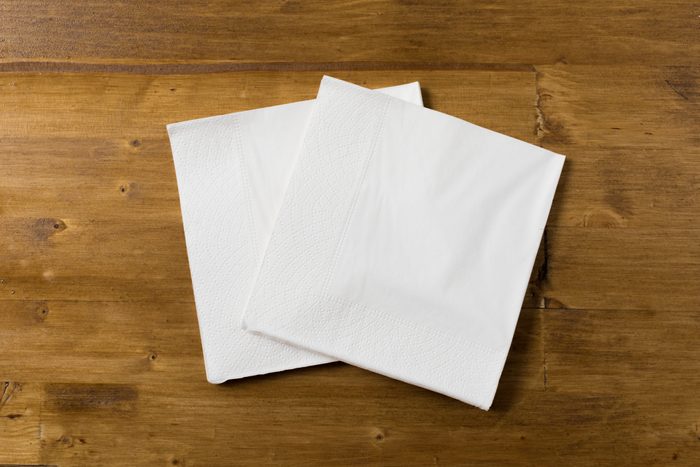
Using beverage napkins to clean up a spill
Spills happen, and grabbing a couple napkins to mop up the drips is a great idea. What’s not? “Grabbing the entire stack of cocktail napkins off the bar and throwing it on a large puddle,” says Hernandez. “I appreciate the help, but we have bar mops and rags for exactly this purpose, and those cocktail napkins are pricey.”
Do this instead: Flag down a server, busser, host or bartender, and explain the situation. They’ll bring out the cleaning supplies.
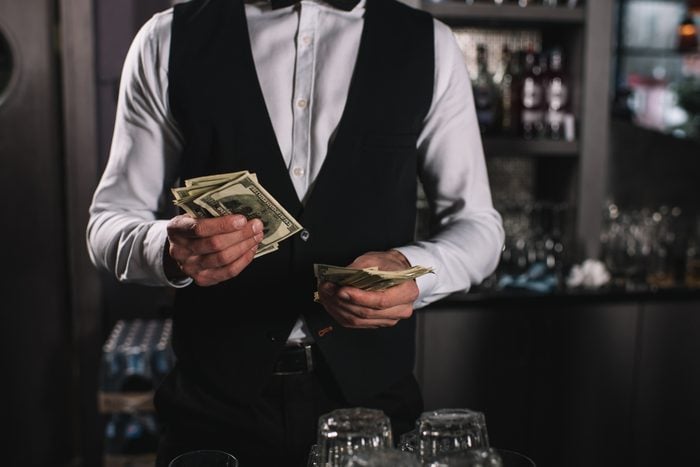
Handing them a wad of cash
On busy nights, you might think it would make sense to hand the bartender cash and let them close out the bill when they have a spare minute. But this isn’t as good an idea as you think it is. “Sometimes people will just hand me a ball of cash and be like, ‘This is for the bill—keep the rest for your tip,'” says Joe. “And these are usually the people who end up stiffing us money.” Even if you’re not trying to be dishonest, it’s easy to make a mistake calculating the bill plus tip.
Do this instead: Hand the bartender cash, and wait for them to count it and close the tab. Then offer a tip. Note: Tipping etiquette will be different depending on where you are and the type of bar it is—for instance, you generally won’t be expected to tip at an all-inclusive resort, though it can still be a nice gesture.

Not bothering them with unrelated issues
You may not want to bother the bartender with extra concerns beyond making drinks—especially if the line to the bar is three deep—but there are some things that are always good etiquette to bring to the bartender’s attention. “If you see someone slip something into someone else’s drink, alert me or the other staff immediately,” says Mitchell Allen, a hotel and catering bartender in Seattle. Other things you should tell your bartender about: first-aid issues, health emergencies and if you need help getting home safely.
Do this instead: If something is a safety concern, let your bartender or other staff member know immediately. “Guests’ comfort and safety is always our top priority,” Allen says.
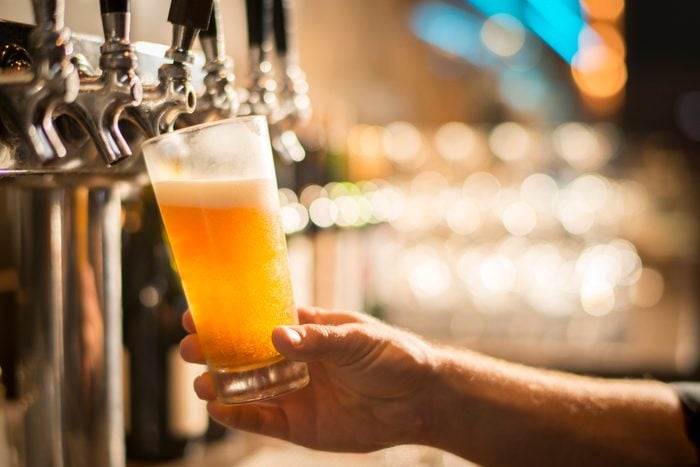
Keeping things simple without a menu
Skipping the menu keeps things simple for you and the bartender … as long as you know exactly what you want. “People will come in and say, ‘Oh, I don’t need a menu—I’m not here for anything fancy,’ and then say, ‘What beers do you have?’ But that’s the point of the menu!” says Allen. “We have 20 rotating beers on tap, and I don’t want to have to recite them every time.”
Do this instead: If you know exactly what you want, order it right away. If you’re unsure, look at the menu first, before asking questions. The same is true of steakhouse etiquette.
